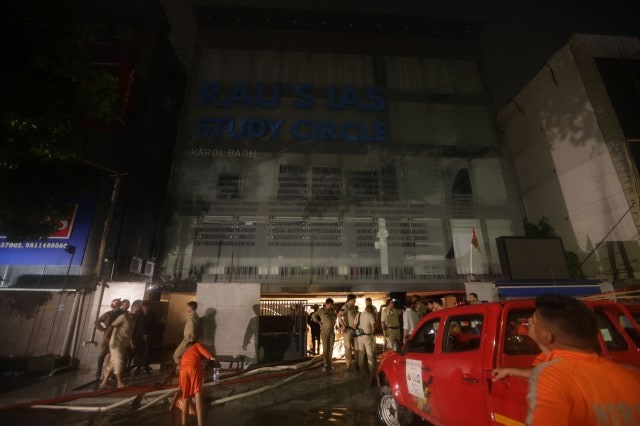Delhi Hardlook | UPSC aspirants drown in basement: Delhi’s coaching hub a year after Rau IAS academy tragedy
Last year, three UPSC aspirants drowned in a flooded basement of a coaching centre in Old Rajinder Nagar — which brought to light institutional apathy and civic irregularities
 Rescue operation underway after two female students were found dead after the basement of Rau’s IAS, a UPSC coaching centre in Rajendra Nagar, was flooded following a nearby drain burst on July 27, 2024 (Express Photo/Gajendra Yadav)
Rescue operation underway after two female students were found dead after the basement of Rau’s IAS, a UPSC coaching centre in Rajendra Nagar, was flooded following a nearby drain burst on July 27, 2024 (Express Photo/Gajendra Yadav)For Nesie Dalvin, a visit to the national capital would never be the same again.
Delhi once held fond memories — long Metro rides with her brother Nevin, navigating stations, discovering the Capital through his eyes.
“I’ve visited Delhi two or three times… I was always confused about which Metro to take… He gave me my first Metro card,” says the 26-year-old PhD student who lives in Kerala.
“When I came to collect his belongings… after the incident… it felt like I saw him everywhere — at the Metro, in Rajinder Nagar…”
On July 27 last year, Nevin (28) had been studying in the basement library of Rau’s IAS Study Circle in Old Rajinder Nagar. He was pursuing a PhD in Visual Arts from Jawaharlal Nehru University and was prepping for the UPSC Mains exam.
Around 6.30 pm, water began to collect on the road outside after heavy rain lashed the city. Suddenly, a Force Gurkha SUV drove through the stretch — forcing a wave of water that breached the gate and broke it. Water gushed into the building, flooding the basement. Several students were trapped inside.
Later that night, after frenzied rescue efforts, Nevin’s body would be found along with two other UPSC aspirants — Shreya Yadav, 25, from Uttar Pradesh, and Tanya Soni, 25, from Telangana.
What followed were student protests, a political blame game, suspension of government officials for negligence, and several arrests that included the building owners, the coaching centre CEO — and even the SUV driver. The CBI took over the probe in August.
The Indian Express revisits the site of the tragedy a year later to see if things have changed on the ground.
On the ground
At 11B, Bada Bazar Road in Old Rajinder Nagar, stands the four-storey building that once housed the coaching giant. The big, bold blue letters displaying Rau’s name have since been removed. The windows are covered in opaque white sheets, and large ‘For Rent’ banners hang across the facade. A new black gate guards the entrance.
A court had last year said it cannot resume operations from the premises.
Alongside it are several well-known coaching institutes — Sriram’s IAS, Insights IAS, and Shubhra Ranjan’s Institute for Humanities.
Sachin, 23, who studies at Vision IAS Academy, watched the tragedy unfold on the news from his home in Madhubani. “I said to myself then that I won’t go to Rau’s,” he recalls.
 Rau’s IAS Study Circle 1B, Bada Bazar Rd, Old Rajinder Nagar, Rajinder Nagar, New Delhi (Express/Amit Mehra)
Rau’s IAS Study Circle 1B, Bada Bazar Rd, Old Rajinder Nagar, Rajinder Nagar, New Delhi (Express/Amit Mehra)
He moved to Delhi in May after clearing the UPSC prelims. “Many coaching centres have shifted their classes from the basement to upper floors. That’s what I have heard,” he adds.
The deaths put the spotlight on the unauthorised use of basements in the area, where many coaching centres and independent libraries had been operating commercial activities in violation of the MCD bylaws. These regulations permit basements to be used only for parking or storage.
According to the chargesheet filed by the CBI last October, the Municipal Corporation of Delhi (MCD) initiated enforcement action in August 2024. Show cause notices previously issued to several establishments, primarily coaching centres, in the area were acted upon by officials from the Karol Bagh Zone.
In total, 83 show cause notices covering 123 units were served. Based on these, the MCD sealed 52 basements between August 4 and September 4, including those used by coaching centres, libraries, and private offices.
Sachin, however, claims that basement spaces remain in use — albeit for different commercial purposes. “I visit a library which is on the second floor of a building. In the adjacent building, a gym is operating in the basement. Until about a year ago, my library was in that same basement. But after the deaths, they shifted,” he says.
One such commercial business that functions from a basement is Emerald Gym, a fitness centre chain, located about 300 metres from the former Rau’s IAS building.
Poonam, a representative of the Emerald Gym, says, “We have the required permission from MCD to operate the gym in the basement. We have complied with waterproofing and other requirements. We also applied for the fire safety certificate (FSC) about 90 days ago, but have yet to receive it. It’s in the process.”

Another such establishment is Mind Veda, a mental healthcare service also operating from a basement. When contacted, representatives say the space is used only for correspondence and storage.
“Mind Veda’s correspondence office and storage are situated as shown. However, it’s reiterated that we’re functional on the ground floor…,” a company spokesperson says. Questions regarding fire safety certification from the Delhi Fire Services (DFS) and clearances from the MCD are unanswered.
Libraries, meanwhile, are now on higher floors.
Books and Brain Library, which began operations after the Rau’s IAS tragedy, is on the first floor of a building in the area. Puneet, its representative, says all mandatory safety protocols were duly observed. “We charge Rs 3,000-Rs 3,500 a month — slightly lower than other building-based libraries. Our FSC is valid until 2030,” he says.
But the shift away from basements has come at a cost.
Vibhu, 25, a UPSC aspirant who took part in the 10-day protest following the deaths, says that the monthly fees of libraries have risen sharply.
“It used to cost Rs 1,500 to Rs 2,000 a month but is now Rs 5,000-Rs 7,000. It’s almost the rent of a PG room. The library owners say that rents are high in buildings, so charges will be as well. For many, it has become unaffordable to study in libraries,” she says.
Coaching centres have also ramped up safety protocol. However, some face structural issues in the buildings they occupy.
Rahul Jain, a representative of IAS Hub — located opposite the building that used to house Rau’s— recalls a fire that broke out in their premises in May. “The sprinklers activated immediately… We have a valid FSC and a proper open exit route. But the landlord had installed a small gate at the exit, which delayed evacuation… In such cases, our hands are tied,” he says.
Jain adds that the MCD conducted multiple inspections this year across coaching centres to ensure compliance with the Delhi Master Plan 2021, particularly regarding floor plans and construction standards. “There was no waterlogging in our area during the recent heavy rain,” he adds.
The many lapses
Six people were arrested in the case: Parvinder Singh, Harvinder Singh, Sarabjit Singh, and Tajinder Singh — the co-owners of the building where Rau’s IAS was allegedly running the basement library; coaching centre CEO Abhishek Gupta; and centre coordinator Deshpal Singh. All of them are out on interim bail.
The Delhi Police had also arrested the SUV driver, Manuj Kathuria, 50, a businessman, in connection with the case. He was accused of forcing the wave of water that breached the entrance and led to flooding in the basement. Stating that he was implicated by the Delhi Police in “over-enthusiasm”, a Delhi court later granted him bail.
In its first chargesheet against the six accused filed in Rouse Avenue Court, the CBI had said the deaths were due to an insufficient drainage system, a highly unstable main entrance gate used as a floodwater barrier, and a cubicle with a lockable door at the entry point that got blocked, preventing students’ escape.
In its 71-page supplementary chargesheet filed on April 27 against three public servants — a junior engineer of the MCD, an assistant divisional officer and a divisional officer of the DFS — the CBI said the MCD and the DFS had failed to report the unauthorised use of the basement as a coaching centre — despite conducting multiple inspections of the premises and having photographic evidence.
The chargesheet also accused CEO Gupta of criminal conspiracy, alleging that he appointed consultant Ashok Narang to liaison with DFS and MCD officials to get the fire clearance certificate quickly to ensure the basement could be used as a library-cum-study centre.
Rau’s remained unavailable for comment.
The counsel for the accused persons had argued in court that the incident was “unprecedented and could not have been anticipated”. They had also said the occupation of the basement was not prohibited and that the responsibility of the owners of the building and the coaching institute couldn’t be stretched beyond a point, when it was actually the civic authorities who were responsible for the “inaction and idle approach towards maintaining the drainage system”.
When contacted for comment, a senior MCD official had earlier said an internal inquiry is underway. “The matter is sub-judice,” the official added.
When asked whether a commercial establishment can legally operate in a basement now, a DFS official replied: “Unless an FSC has been issued following all mandatory checks by DFS inspectors, no establishment — basement or otherwise — can begin operations. The FSC is the final proof of fire safety compliance.”
Honouring Nevin
For the Dalvin family, the wait for justice has been unending. The family has grown weary of the long trial — especially after Rau’s CEO got bail.
“He got bail so easily. Since then, we’ve only heard from lawyers about court proceedings and hearing dates. There’s also a language barrier — my parents struggle to understand what the lawyers explain, because most of it is in Hindi. And, of course, they can’t come to Delhi every time for court,” says Nesie.
She also mentions the MCD’s promise to set up four libraries in memory of the victims. She hasn’t heard about any progress on that front.
“When we contacted them (Delhi government officials), we were told the government had changed, so it will take longer. They couldn’t even make a memorial that they promised…,” she says.
Earlier this year, the DDA’s first 24×7 library, ‘Aarambh’, was opened in Old Rajinder Nagar by L-G V K Saxena. The L-G had asked the DDA to provide library and reading room facilities to students in the wake of the deaths. Five community centres have been identified to be converted into libraries.
In the meantime, Nevin’s family has devised a way to honour their son’s memory. Nesie has published two books in her brother’s name based on his thesis. This Sunday, they will inaugurate a room inside their home showcasing all his belongings.
“We will also inaugurate a hall in his name, which students here can use as a research centre. Nevin would have wanted to do that. He always wanted to return home… and work for the locals,” says Nesie.











